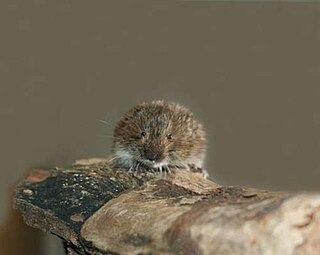
Yucca brevifolia is a plant species belonging to the genus Yucca. It is tree-like in habit, which is reflected in its common names: Joshua tree, yucca palm, tree yucca, and palm tree yucca.

Taxus brevifolia, the Pacific yew or western yew, is a species of tree in the yew family Taxaceae, native to the Pacific Northwest of North America. It ranges from southernmost Alaska south to northern California, mostly in the Pacific Coast Ranges, but with isolated disjunct populations in southeast British Columbia and in north to central Idaho.

Notiosorex cockrumi, also called Cockrum's gray shrew or Cockrum's desert shrew, is a tiny species of shrews named in 2003. This red-toothed shrew, which is as light as a penny, is the first new mammal species from Arizona since 1977. Its range extends from Arizona to central Sonora, Mexico.

The Tatra pine vole, also called the Tatra vole or Tatra ground vole, is a species of vole endemic to the Carpathian mountain range in Slovakia, Poland, Ukraine and Romania. Two subspecies have been recognised. M. t. tatricus occupies the western part of the range in Slovakia and Poland, and M. t. zykovi is found in Ukraine and Romania.

Amentotaxus argotaenia, the catkin yew, is a species of conifer in the family Taxaceae. It is a shrub or a small tree up to 7 metres (23 ft) tall.

Juniperus brevifolia, the Azores juniper, is a species of juniper, endemic to the Azores, where it occurs at altitudes of 240–800 m, rarely up to 1,500 m. It is closely related to Juniperus oxycedrus of the Mediterranean region and Juniperus cedrus of the Canary Islands. It is threatened by habitat loss.

Villa's gray shrew is a shrew native to northeastern Mexico, where it is called musaraña.

The dryad shrew tenrec, also known as the tree shrew tenrec, is a species of mammal in the family Tenrecidae. It is endemic to Madagascar. Its natural habitat is subtropical or tropical moist lowland forests. It is vulnerable to extinction by habitat loss.

The Ugandan lowland shrew is a species of mammal in the family Soricidae. It is found in Kenya and Uganda. Its natural habitats are subtropical or tropical swamps and subtropical or tropical moist montane forest. It is threatened by habitat loss.
Austroblechnum divergens, synonyms including Blechnum divergens, Blechnum rimbachii and Blechnum floresii, is a species of fern in the family Blechnaceae.
Vasconcellea pulchra is a species of plant in the family Caricaceae. It is endemic to Ecuador. Its natural habitat is subtropical or tropical moist montane forest. It is threatened by habitat loss.

Phaedranassa is a genus of South American and Central American plants in Amaryllis family, subfamily Amaryllidoideae.
Phaedranassa cinerea is a species of plant that is endemic to Ecuador. Its natural habitat is subtropical or tropical moist montane forests. It is threatened by habitat loss.
Phaedranassa glauciflora is a species of plant that is endemic to Ecuador. Its natural habitat is subtropical or tropical dry shrubland. It is threatened by habitat loss.
Phaedranassa schizantha is a species of plant that is endemic to Ecuador. Its natural habitat is subtropical or tropical dry shrubland. It is threatened by habitat loss.

Phaedranassa tunguraguae is a species of plant that is endemic to Ecuador. Its natural habitats are subtropical or tropical moist montane forests and subtropical or tropical dry shrubland. It is threatened by habitat loss.
Phaedranassa viridiflora is a species of plant that is endemic to Ecuador. Its natural habitat is subtropical or tropical dry shrubland. It is threatened by habitat loss.
Grevillea brevifolia, commonly known as Cobberas grevillea, is a species of the plant genus Grevillea. It is native to the states of Victoria and New South Wales in Australia. The red flowers appear between November and December in the species' native range. The species was first formally described by Victorian Government Botanist Ferdinand von Mueller in 1879 in Flora Australiensis, based on a collection from Mount Tambo in Victoria. The former subspecies G. brevifolia subsp. polychroma was elevated to species status as Grevillea polychroma in 2005. Grevillea brevifolia is listed as "Rare in Victoria" in the Department of Environment and Primary Industries' Advisory List of Rare Or Threatened Plants In Victoria. The species occurs in sub-alpine areas including the Pilot Wilderness, the Cobberas-Tingaringy Unit of the Alpine National Park, and Mount Seldom Seen.

Pseudanchomenus is a beetle genus in the family of ground beetles (Carabidae). Its only described species, Pseudanchomenus aptinoides, is endemic to the Azores archipelago.












